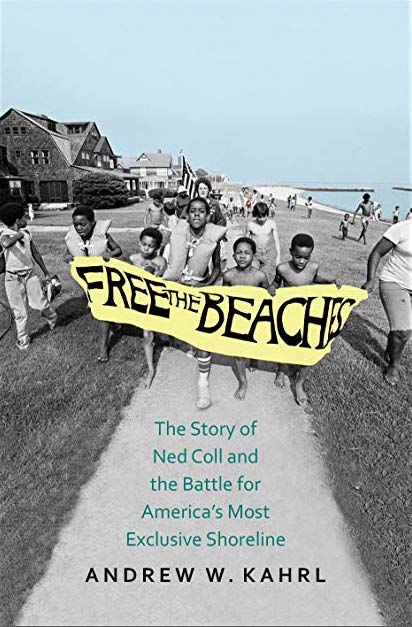 This week at In The Past Lane, the history podcast, I speak with Historian Andrew W. Kahrl about his new book, Free the Beaches: The Story of Ned Coll and the Battle for America’s Most Exclusive Shoreline. Beaches, like any public space in the US, have long been contested public spaces. That’s because throughout American history, the definition of the public – the citizenry – has never been agreed-upon, leading to the marginalization and exclusion of various racial, ethnic, and economic groups, not to mention women. And so attempts to access and use public spaces by these various marginalized groups have often been met with resistance. No doubt this brings to mind classic images of civil rights activists being violently attacked for sitting at whites-only lunch counters across the south during the 1950s and 1960s. Or Rosa Parks being arrested for refusing to yield her seat to a white man on a public bus.
This week at In The Past Lane, the history podcast, I speak with Historian Andrew W. Kahrl about his new book, Free the Beaches: The Story of Ned Coll and the Battle for America’s Most Exclusive Shoreline. Beaches, like any public space in the US, have long been contested public spaces. That’s because throughout American history, the definition of the public – the citizenry – has never been agreed-upon, leading to the marginalization and exclusion of various racial, ethnic, and economic groups, not to mention women. And so attempts to access and use public spaces by these various marginalized groups have often been met with resistance. No doubt this brings to mind classic images of civil rights activists being violently attacked for sitting at whites-only lunch counters across the south during the 1950s and 1960s. Or Rosa Parks being arrested for refusing to yield her seat to a white man on a public bus.
But beyond these high profile incidents, there were many, many efforts to gain access to public spaces by African-Americans another marginalized groups. In the 1930s, 1940s, and 1950s, African-American civil rights activists, whose names you will never know, battled to disaggregate public golf courses, public pools, and public parks. And, yes, public beaches.
As we learn in my conversation with historian Andrew Kahrl, some of these battles took place in the deep South, but others occurred in the north, in elite parts of New England like Greenwich, CT. In these instances, African Americans didn’t encounter explicit sign saying “whites only.” But they did face innumerable barriers that were subtle, but also very effective at limiting access by people deemed “outsiders.”
In the course of our discussion, Andrew Kahrl explains:
How for centuries the “public trust doctrine” considered waterfront land to be public property open to all.
How after WWII, as suburbanization flourished and long-neglected shoreline property suddenly became valuable, communities with beaches began to restrict access to residents or members of private beach associations.
How in the same era marked by public policies like redlining that promoted residential and school segregation, similar initiatives excluded people of color from beaches. 
How the Open Beaches movement emerged to oppose efforts to privatize parts of the American coastline and to restrict access by the public.
How Ned Coll became in the 1960s and 1970s a civil rights activist who worked to force Connecticut communities – including elite towns like Greenwich, CT – to open their public beaches to all.
How “wade-ins” at segregated beaches became the equivalent of “sit-ins” at segregated lunch counters during the civil rights era.
Why a 2001 state Supreme Court decision that forced Connecticut communities to make their public beaches open to non-residents has led those communities to develop new exclusionary policies that perpetuate the exclusion of the poor and people of color.
Why recent incidents involving white Americans calling the police on African Americans who are using public parks, pools, golf courses, and beaches is part of a long tradition of using minor ordinances to police black bodies.
Andrew W. Kahrl, Free the Beaches: The Story of Ned Coll and the Battle for America’s Most Exclusive Shoreline (Yale University Press, 2018)
Andrew W. Kahrl, The Land Was Ours: How Black Beaches Became White Wealth in the Coastal South
Andrew W. Kahrl, “The North’s Jim Crow,” New York Times, May 27, 2018 https://nyti.ms/2xkcpsF
Gregory W. Bush, White Sand Black Beach: Civil Rights, Public Space, and Miami’s Virginia Key
Robert J. Robertson, Fair Ways: How Six Black Golfers Won Civil Rights in Beaumont, Texas
Richard Rothstein, The Color of Law: A Forgotten History of How Our Government Segregated America
Shirley A. Wiegand and Wayne A. Wiegand, The Desegregation of Public Libraries in the Jim Crow South: Civil Rights and Local Activism
Related ITPL podcast episodes:
041 Erin Krutko Devlin on the Little Rock Crisis of 1957
035 Richard Rothstein the Color of Law
Music for This Episode
Jay Graham, ITPL Intro (JayGMusic.com)
Kevin McCleod, “Impact Moderato” (Free Music Archive)
Andy Cohen, “Trophy Endorphins” (Free Music Archive)
Jon Luc Hefferman, “Discovery” (Free Music Archive)
Jon Luc Hefferman, “Winter Trek” (Free Music Archive)
The Bell, “I Am History” (Free Music Archive)
Production Credits
Executive Producer: Lulu Spencer
Technical Advisors: Holly Hunt and Jesse Anderson
Podcasting Consultant: Dave Jackson of the School of Podcasting
Photographer: John Buckingham
Graphic Designer: Maggie Cellucci
Website by: ERI Design
Legal services: Tippecanoe and Tyler Too
Social Media management: The Pony Express
Risk Assessment: Little Big Horn Associates
Growth strategies: 54 40 or Fight
© In The Past Lane, 2018
Recommended History Podcasts
Ben Franklin’s World with Liz Covart @LizCovart
The Age of Jackson Podcast @AgeofJacksonPod
Backstory podcast – the history behind today’s headlines @BackstoryRadio
Past Present podcast with Nicole Hemmer, Neil J. Young, and Natalia Petrzela @PastPresentPod
99 Percent Invisible with Roman Mars @99piorg
Slow Burn podcast about Watergate with @leoncrawl
The Memory Palace – with Nate DiMeo, story teller extraordinaire @thememorypalace
The Conspirators – creepy true crime stories from the American past @Conspiratorcast
The History Chicks podcast @Thehistorychix
My History Can Beat Up Your Politics @myhist
Professor Buzzkill podcast – Prof B takes on myths about the past @buzzkillprof
Footnoting History podcast @HistoryFootnote
The History Author Show podcast @HistoryDean
More Perfect podcast – the history of key US Supreme Court cases @Radiolab
Revisionist History with Malcolm Gladwell @Gladwell
Radio Diaries with Joe Richman @RadioDiaries
DIG history podcast @dig_history
The Story Behind – the hidden histories of everyday things @StoryBehindPod
Studio 360 with Kurt Andersen – specifically its American Icons series @Studio360show
Uncivil podcast – fascinating takes on the legacy of the Civil War in contemporary US @uncivilshow
Stuff You Missed in History Class @MissedinHistory
The Whiskey Rebellion – two historians discuss topics from today’s news @WhiskeyRebelPod
American History Tellers @ahtellers
The Way of Improvement Leads Home with historian John Fea @JohnFea1
The Bowery Boys podcast – all things NYC history @BoweryBoys
Ridiculous History @RidiculousHSW
The Rogue Historian podcast with historian @MKeithHarris
The Road To Now podcast @Road_To_Now
Retropod with @mikerosenwald

